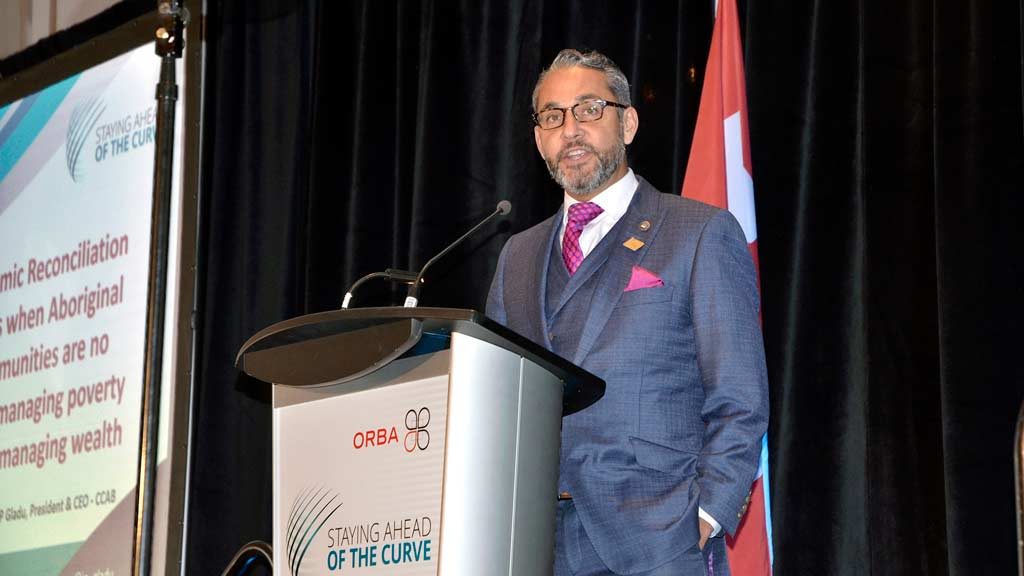If you don’t engage with the Indigenous economy and the Indigenous people, you’re going to start to lose competitiveness.
That was the message from JP Gladu, president and CEO, Canadian Council for Aboriginal Business (CCAB), to delegates at the Ontario Road Builders’ Association’s 93rd annual convention in Toronto Feb. 3.
“I hope that by the end of your day today you start to recognize that there is a plethora of opportunities for companies like yours to engage people like me and Indigenous businesses,” said Gladu.
“You have to make time and effort to get to know the Indigenous community or you’re not going to understand us, and if you don’t understand us how are you going to work with us? If you don’t work with us, you’re going to lose competitiveness, maybe not in the next two or three years, maybe not in the next four or five, but you will eventually lose your competitiveness.”
Aboriginal businesses are underrepresented in the supply chains of most Canadian corporations and governments and CCAB is looking for ways to strengthen connections between those groups across the country. CCAB built an Aboriginal Procurement Marketplace to help with the challenges of getting access to contracts.
Gladu said corporations and government need to champion aboriginal procurement to advance economic reconciliation and come together to “supply change,” which means including aboriginal suppliers through their own supply chains.
“We are all about, at CCAB, the idea of economic reconciliation,” Gladu explained. “Our people have been managing poverty for over 150 years. We are here to create the space as an organization between Indigenous and non-Indigenous organizations to help our country as well as the Indigenous people to foster an equitable and sustainable economy across Canada.
“We do that through our programs and events and we also have the best research in the world on an Indigenous economy because decision makers need to have data to make good decisions.”
Gladu said there is an incredible storyline emerging in Canada about a strong Indigenous economy growing in the private sector. He talked about working with Mark Little, Suncor CEO and co-chair of Aboriginal Procurement Champions, to spread the message of the importance of including Indigenous businesses in the supply chain. He pointed out that Suncor spent $700 million in one year on Indigenous businesses.
The challenge, he said, has been influencing the federal, provincial and municipal levels of government to do the same. Now that CCAB has been able to back up the story line with data, the narrative is starting to change.
In 2017, of the more than $16 billion of the federal government spend, only .32 per cent was spent on Indigenous businesses. That translates to $60 to $65 million, Gladu explained.
In October 2019, the CCAB’s Supply Change Initiative to secure an increase in federal procurement from Aboriginal businesses to five per cent was recognized in the Liberal Party election platform.
“Whether you like this government or not, the Trudeau government has made Indigenous relationship a top priority for his government,” Gladu said. “Canada is finally starting to wake up to the fact that there is a need, but no one wants to set themselves up for failure so that’s where the data comes in. This is where we start to understand the real magnitude of Indigenous entrepreneurs in this country.”
According to CCAB’s research, aboriginal businesses can not only meet the five per cent target of government contracts but can hit a quarter, or over 24 per cent, of the federal government spend.
The Indigenous economy contributes $31 billion to Canada’s GDP, about $12 billion of that comes from Indigenous entrepreneurs, Gladu noted. In addition, it is estimated there are over 50,000 aboriginal businesses looking for business opportunities.
“Aboriginal businesses are on the hunt, they are hungry for business just like you are and there is a real opportunity that I hope you see to partner together,” said Gladu.
“There are opportunities within your own sectors to procure and build relationships with Indigenous people and businesses… This is the type of mindset that this country needs to start to develop. As partners we are much stronger advocates for development. We don’t want to fight, we just want access to the opportunities that you have had access to for a very long time.”
Follow the author on Twitter @DCN_Angela.











Recent Comments
comments for this post are closed